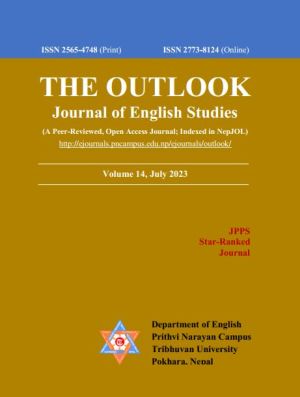Human-Nature Interactions in the Poetry of Laxmi Prasad Devkota and Rabindranath Tagore
DOI:
https://doi.org/10.3126/ojes.v14i1.56654Keywords:
Ecocriticism, environment, nature, human worldAbstract
This paper attempts to show what ecocriticism is and how it is applied to the poems of Laxmi Prasad Devkota, a great poet of Nepal, and Rabindranath Tagore, a great poet of Bengali in India. Although they belong to two different South Asian countries, they deal with love and concern of nature in their poems. In this study, I have explored some literary attributes and ecocritical aspects of the poems of these poets. Some of their similarities have been discussed in this paper. Even though both the poets are popular in other genres of literature, the focus of this paper is to analyze the poems from the perspective of ecocriticism. These poets wrote the poems about nature even before the word ‘Ecocriticism’ came into existence and got defined. However, Devkota and Tagore were using the ecocritical standpoint to write their poems before the term was coined. The two poems of Devkota: “The Swallow and Devkota” and “The Brook” have been undertaken for the textual analysis. Similarly, the two poems of Tagore: “The Tame Bird Was in a Cage” and “The Banyan Tree” have been selected for textual analysis. Overall, this paper has shown the connection between the human world and the natural world and the ecocritical aspect in the poems of Devkota and Tagore.
Downloads
Downloads
Published
How to Cite
Issue
Section
License

This work is licensed under a Creative Commons Attribution-NonCommercial 4.0 International License.
This license enables reusers to distribute, remix, adapt, and build upon the material in any medium or format for noncommercial purposes only, and only so long as attribution is given to the creator.

